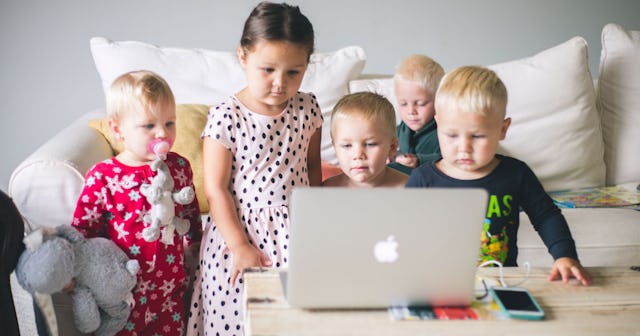The Bond We Share With Our Cousins Is So Special

I grew up with a pack of cousins. I shared an elementary school classroom, at different times, with not one but two of them (and usually, in math and language arts, with both). My favorite cousin and I shared a fifth grade homeroom; I distinctly remember sitting on our desks and braiding each other’s hair. My cousin: the BFF I could always count on, whether she was my BFF or not, because she was my cousin. Always on my side in playground fights, even when I was an obnoxious brat. Just like I was always on hers. That’s what cousins meant.
My sons have this, and while they may not live as close to their cousins as I did, I’m so grateful they have the cousin experience. When they get together, they’re automatic BFFs, as if no time has passed. They’re very different kids, both in temperament and in interests, but they all get along wonderfully and find common ground without seeming to try. It’s special. There’s no one they’d rather play with than their cousins — no matter that they see them only four times a year.
My paternal cousins and I played in a pack, my brother and I, my same-age cousin and her brother. We annoyed the hell out of our other cousin, five years older and so much cooler. Cousins meant everything: they were better than friends, because you might fight with friends, but you had to make up with your cousins. And even when you were mad at your cousins, if they fought with someone else, you were right there to help. Cousins meant loyalty, all the time. You could fall out with your BFF, fight over friendship bracelets and feel sick over it; they might never talk to you again. But that never happened with your cousin. Cousins always figured out a way to forgive and move on.
This happens with my sons, too. The cousins can get angry at each other, but the anger almost seems to come with a side of bafflement: you’re my cousin, how can we fight? They make up quickly, and make a serious effort to do so. They don’t want to fight.
And as cousins, when we got in trouble, we got in trouble together. We knew our parents were calling their parents. In a way, it made everything better, blame got shared. No one got it worse than someone else. We do the same thing with our kids. No one gets it worse; blame is shared by all parties. There’s none of the equivocating you get with other kids, when you’re worried about offending their parents. Nope. You can call that other kid out just as much as you call out your own. It’s more fair. The kids know it, and it’s special that way.
Edward Cisneros/Unsplash
Everything was easier as close cousins. You knew they’d show up at your birthday party. You knew your parents would let you sleep over. You knew the house rules; they knew your house rules. Even if you were a little bit younger or a little bit older, it didn’t matter: you were cousins, and being cousins transcends age.
I see this in my own sons. My 7-year-old and his 9-year-old cousin are the tightest out of the whole group, despite their age difference. My 9-year-old nephew will play with my 5-year-old. The same way I played with my 3-years-younger cousin sometimes. Just because I liked to play with him, and it wasn’t weird, the way it might have been if we were just regular kids. We were cousins, and so everyone saw it as socially acceptable.
That bond was so special to me. My paternal cousin and I rode horses together. We played on the playground together; we climbed trees together; we made forts together and got yelled at together and once made prank calls together while playing the game Mall Madness (we got in so much trouble). You share a childhood with these other small people in a way you don’t share it with others. Holidays and birthdays, grandparents and aunts. They all belong to you in common. When I think of my cousins sometimes, their faces rise in my memory not as the adults they are today, but as the small visages of the children they were. We hid behind the lilac bushes together and played in the sandbox.
Alfonso Romero/FreeStock
I wonder what my own sons will remember of their cousins. Probably the beach; they will recall sand castles and surfing lessons, long rainy days working puzzles. They may remember the time they all lied and said the other one’s parent had put on a terrible, boring, awful TV show they loved, and watched incessantly for three days until we finally pieced together the truth.
Years later, I don’t talk much to my cousins. We’ve lost touch somewhat, time and distance conspiring to send us drifting. But I know I could call them, always. Even the one who has virulently different political beliefs. I know I could say, “Hey, remember that time I popped the head off your Barbie at your third birthday party, and your mom almost killed me?” We carry each other’s childhoods in our heads — and our hearts. The bond remains. I know I am welcome at their table; they know they are welcome at mine. Always, the door is open.
You can’t say that for many people anymore. It’s a precious thing, this eternal welcome, the memories we carry for one another. I am grateful to have it, however far my cousins live. I know my sons will have it one day. And already, I am glad of it.
This article was originally published on